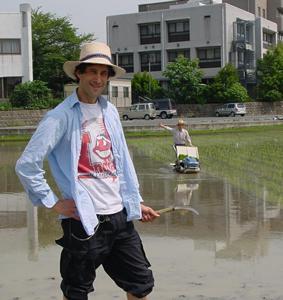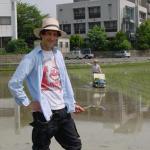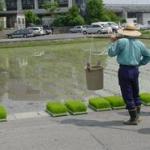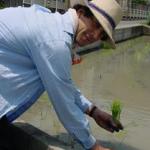Rice Paddy
Rice is a very important part of life in Japan. It is serves as the foundation of every meal. The Japanese word for "meal" is the same as the word for "rice", "gohan". But it's more than that. It takes on a kind of spiritual significance. It serves as a link with the past. Everywhere you travel in Japan you see rice paddies. Even in big cities like Kyoto, it is not uncommon to see a rice paddy wedged into a vacant lot between stores, apartments and other big city things. There is something so peaceful and timeless about them. The water's surface acts like a mirror, reflecting the light of the sky and reminding us of slower, peaceful days.
It is not uncommon for an average family to have a rice paddy much like people in the U.S. would have a big garden. Considering the price of rice in Japan (about $3 a pound) it also pays to do it. It is an activity that brings the entire family together for a few days every year during planting and harvesting time. Everyone pitches in and helps, from the children to the grandparents.
The end of May and the beginning of June is rice-planting time in Japan. One of the women at work mentioned that her family was getting ready to plant rice. My ears pricked up. I had been wanting to do that for a long time. Soon I was invited to spend Friday night over so that we could start bright and early on Saturday morning. We drove out to a small town north of Kyoto and I met the family. It was a typical Japanese family in many ways. The father's parents lived with the family. The father was the main moneymaker of the family. He was an engineer. The mother was a teacher. They had two grown children, one of whom was my colleague.
A rice paddy is just a flooded piece of land. The water level is about two inches. Often around the border of the land, there is concrete or a built up dirt dam to keep the water in. The water flows through the paddy like a river but very slowly. This water movement is controlled with a series of dams, some on the places where the water comes in and somewhere the water comes out. It sounds very complicated and it is in a way, yet it looks very simple and plain. The water is just controlled with wooden boards that are stuck into the mud, and with the mud itself. If they want more water they reposition the board so that more water comes in. Or they reposition the one on the other side so that less water moves out. It all looks very simple. An old man playing in the water, tugging at a board, slapping some mud here and there, but everything is done for a reason and there is an art to it to be sure.
There is something so timeless and wonderful about watching someone bent over planting rice. It feels like you are watching history or reliving something that is buried deep in your genes. In ancient times all planting was of course done by hand. Nowadays there are other options. There are a variety of machines that speed things up considerably. There are machines that act like a roto-tiller, working the mud around until it is fairly level. Then there are the planting machines. There are the kind that you can ride or the kind that you push. The metal wheels of the planting machines are thin and lift the machine up above the plants. The wheels move in between the rows.
The thing that is planted is rice sprouts. They are just regular rice that has been allowed to sprout into a kind of grass about 6 inches high. They are grown in greenhouses around Japan. Heavy plastic racks, about 2 feet long and 1 foot wide, hold the carpet-like sheets of sprouts. Each tray will yield about 10 kilograms of rice when harvested. It costs 1000 yen, about $8.40. A little math would show you that the value of this rice is about 7,200 yen or an earning of 6,200 yen ($52). The paddy where I was working was about 100 meters by 50 meters and yielded 500 kilos of rice. This is an earning of about 310,000 yen, or about 2,600 dollars. Of course there are other expenses such as renting the machinery and getting the rice hulled and stored. But even so, it is a financially rewarding enterprise. Of course there are other factors that are not monetary, such as the satisfaction of growing your own food.
In the morning we got up and walked over to the paddy. The father and Uncle were already at work. Any romantic notions that I had about rice paddies were quickly dispelled when I saw some big snakes slither away at my approach. The paddy is an ecosystem unto itself. People are the intruders. I was anxious to get into the mud and start squishing around and started to take my shoes off. I looked at the other family members who were working. They all had heavy rubber boots that rose almost to their knees.
"It's the leeches," they told me. "We don't like them. Also there might be a lot of glass down there. You really shouldn't go barefoot." My view of rice paddies was rapidly changing. They gave me some boots but of course they were much too short. In the end I decided to wear an old pair of shoes I had brought along just in case, and brave the leeches. After all, this could be my only chance to work in a rice paddy ever.
The Uncle was working a hand operated rice planter, the kind that you guide through the rows. You put the spout carpets on slanting plates that led down to an apparatus that was able to pluck a small bunch of sprouts from the carpet. These mechanical fingers then rotated down and plopped the sprout into the mud. A pretty amazing little gadget. And it worked perfectly. The mechanical fingers were fixed so the entire plates with the sprout carpets moved back and forth so that there would always be a fresh sprout for the fingers to grab. There were two fingers, one next to each wheel, so that two rows were planted simultaneously.
It was one of my jobs to feed the Uncle the carpets. As he got near the end of the row, I would walk over and roll the carpet up into a circular tube and hand it to him in the paddy. He would move a half used row from one side to the other and then put the new fresh carpet that I had just given him onto the plate. My other, less glamorous job was scrubbing the sprout trays until they were perfectly clean. Of course, these were Japanese rice farmers after all. So everything had to be clean. To do that we stood in the concrete lined ditch next to the paddy, up to our ankles in water, and scrubbed and scrubbed. Not really fun but I was biding my time. The machine couldn't plant very close to the edges. When the machine was done, I was promised that it would be my turn to plant the edges by hand.
So with an eye out for leeches and snakes, I stood in the ditch and scrubbed. When the Uncle neared the end of the row, I jumped out of the ditch and ran over to the edge and rolled up a carpet and handed it to him. That's how I spent the morning from about 8 to 11. Finally the main planting was finished. The father walked over to me and looked at me a little warily. It was like he really didn't want me to mess up his rice paddy. But hey, a deal is a deal and I had scrubbed his stupid trays for three hours.
He walked over to the ditch were I was standing and said in broken English, "Now I teaching you plant rice." He handed me a section of carpet. He snatched at the end of it and pulled off a tuft of sprouts. "So." He looked at me and I nodded. He leaned over the edge of the ditch to the paddy. He pointed to the nice straight machine planted rows and indicated that I was to put the sprouts in line with the already existing rows. "Three centchi," and he pointed down. He plopped the sprout into the mud like a bird pecking at some seeds. It stood up proud and beautiful. He nodded at me and it was my turn.
I pulled at the edge of the carpet but nothing came off. I pulled harder and a large clump came off, too large to plant. I set the carpet on the ledge and with both hands managed to pull off a respectably-sized clump. It took me about 20 seconds, which was about 20 times longer than it had taken him. I looked up for approval and every one was looking at me and laughing. The father nodded with his head and I leaned over the edge of the ditch and stuck my hand into the mud. It was very warm water, almost hot. I held the sprouts between my index finger and thumb and pushed it into the mud. I pulled my hand away and watched as my sprout clump came out of the mud and floated miserably on the water's surface like a drowned swimmer. Again, the laughter. He made it look so easy. I tried again and failed.
Then the father came and showed me that you had to build a little mound of mud if there wasn't enough there already. I tried again and held my breath as I took my hand away. I did it. My sprouts were standing up, even though they were a little crooked. The father grunted and smiled. "Plant here," he said and motioned to the row nearest to the ditch where I was standing. So I started plopping the sprouts in the mud and after a few minutes I started to get the hang of it. It really wasn't so difficult. I walked along the ditch and bent over the concrete barrier into the paddy. After a few minutes of this I started to feel somewhat unsatisfied. What I really wanted was to get into the paddy.
I looked around and no one was watching me anymore. The father was on the far side of the paddy up to his calves in mud. That's what I wanted. So I pulled myself up onto the wall and gingerly stepped between the row I had just planted and the row the machine had planted. I felt my foot sink down into the soft warm muck and it felt great. I smiled a big one just as the father looked up and saw me. He smiled at me and waved. He didn't mind at all. They had just been worried about my shoes. I grabbed the remaining carpet and went back to work. My back was bent and starting to ache but I was so happy. As I went to take another step, there was a tremendous sucking sound and it felt like I might lose my shoe but I didn't. I planted three more rows. I looked back at them when I finished and they were anything but straight, but no one seemed to mind.
There was one more thing I wanted to do before we finished and that was step into the paddy barefooted. So I took off my shoes and eased myself in. I felt my foot sink down, down, down. There seemed to be no end. I was almost up to my knees when I pushed on the wall and pulled myself out. Maybe you had to be small and light to go barefoot. Anyway I tried it. I checked myself for leeches and found none. I guess I was lucky, or maybe they just didn't like the way I tasted.
We went to the house and cleaned up. My friends washed out my muddy shoes while I took a shower. It was 2:00 pm. We'd been working for about five hours but it felt more like twelve. I lay down on the floor and instantly fell into a deep sleep. I woke up to the smell of food on the table. We were having rice ... Japanese vegetables, tofu and miso soup. I dug into the rice with new appreciation. Yes this was their rice that they had planted and picked last year. It tasted good. I looked at the family and I noticed something that I hadn't seen at breakfast. They ate every last grain of rice in their bowl. They didn't leave a single one. I checked every bowl and they were all the same. Spotless. I struggled to clean my bowl using my chopsticks (it's not easy to pick up one grain, you know). Finally I did it and everyone looked at me and smiled. Was it just my imagination or was it the best rice I had ever eaten?
 ThingsAsian
ThingsAsian



















